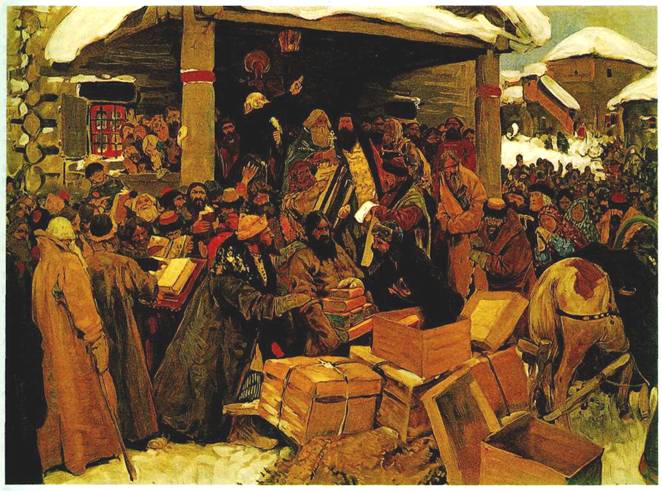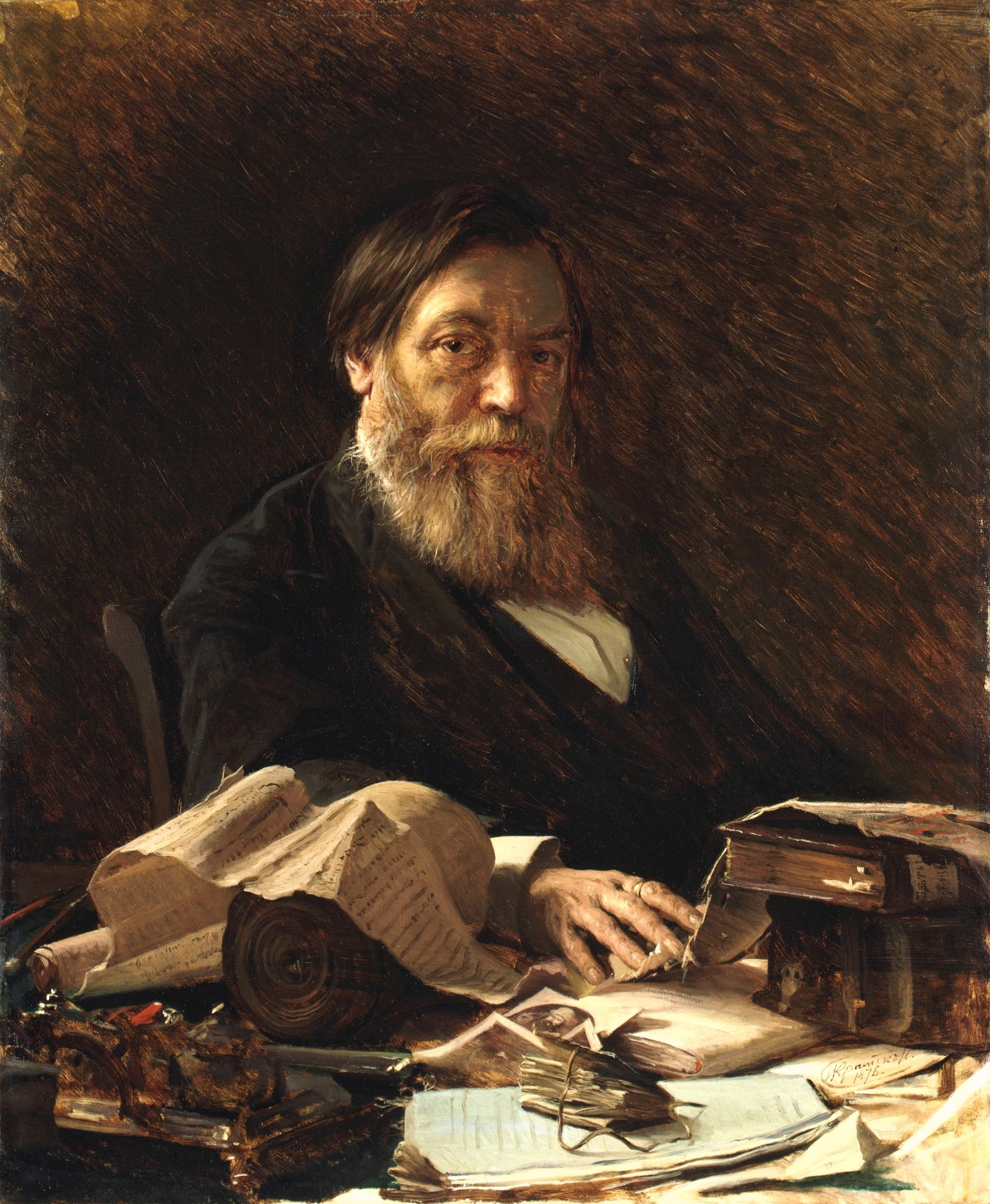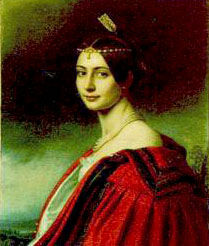|
The Wanderer (Maykov Poem)
The Wanderer (Strannik, Стра́нник) is a poem by Apollon Maykov, first published in the No.1, January 1867 issue of ''The Russian Messenger''. It was dedicated to Fyodor Tyutchev Fyodor Ivanovich Tyutchev ( rus, Фёдор Ива́нович Тю́тчев, r=Fyódor Ivánovič Tyútčev, links=1, p=ˈfʲɵdər ɪˈvanəvʲɪt͡ɕ ˈtʲʉt͡ɕːɪf; Pre-Reform orthography: ; – ) was a Russian poet and diplomat. ... and subtitled: "First part of the drama The Thirsty One". History In his commentaries to the first, magazine version of the poem, Maykov explained: Beguny′ (The Runners) or The Wanderers, or the Sopelsky Agreement (Sopelkovskoye soglasiye), after the Sopelki village where they were based, are all the names for a priest-less sect, representing one of the raskol's extreme factions. The wanderer has to leave behind everything that he’s ever owned, sever all of his social and family ties so as to start living "as a Christ's man". In the same commenta ... [...More Info...] [...Related Items...] OR: [Wikipedia] [Google] [Baidu] |
WikiProject Novels
A WikiProject, or Wikiproject, is a Wikimedia movement affinity group for contributors with shared goals. WikiProjects are prevalent within the largest wiki, Wikipedia, and exist to varying degrees within sister projects such as Wiktionary, Wikiquote, Wikidata, and Wikisource. They also exist in different languages, and translation of articles is a form of their collaboration. During the COVID-19 pandemic, CBS News noted the role of Wikipedia's WikiProject Medicine in maintaining the accuracy of articles related to the disease. Another WikiProject that has drawn attention is WikiProject Women Scientists, which was profiled by ''Smithsonian Magazine, Smithsonian'' for its efforts to improve coverage of women scientists which the profile noted had "helped increase the number of female scientists on Wikipedia from around 1,600 to over 5,000". On Wikipedia Some Wikipedia WikiProjects are substantial enough to engage in cooperative activities with outside organizations relevant t ... [...More Info...] [...Related Items...] OR: [Wikipedia] [Google] [Baidu] |
Raskol
The Schism of the Russian Church, also known as Raskol (russian: раскол, , meaning "split" or " schism"), was the splitting of the Russian Orthodox Church into an official church and the Old Believers movement in the mid-17th century. It was triggered by the reforms of Patriarch Nikon in 1653, which aimed to establish uniformity between Greek and Russian church practices. Church reforms and reaction to them The members of an influential circle called the Zealots of Piety (Russian: Кружок ревнителей благочестия, ''Kruzhok revnitelei blagochestiya'') stood for purification of Russian Orthodox faith. They strove to reform Muscovite society, bringing it into closer accordance with Christian values and to improve church practices. As a consequence, they also were engaged in the removal of alternative versions and correction of divine service books. The most influential members of this circle were Archpriests Avvakum, Ivan Neronov, Stephan Voni ... [...More Info...] [...Related Items...] OR: [Wikipedia] [Google] [Baidu] |
Russian Poems
Russian(s) refers to anything related to Russia, including: *Russians (, ''russkiye''), an ethnic group of the East Slavic peoples, primarily living in Russia and neighboring countries *Rossiyane (), Russian language term for all citizens and people of Russia, regardless of ethnicity *Russophone, Russian-speaking person (, ''russkogovoryashchy'', ''russkoyazychny'') * Russian language, the most widely spoken of the Slavic languages *Russian alphabet * Russian cuisine *Russian culture *Russian studies Russian may also refer to: * Russian dressing *''The Russians'', a book by Hedrick Smith * Russian (comics), fictional Marvel Comics supervillain from ''The Punisher'' series * Russian (solitaire), a card game * "Russians" (song), from the album ''The Dream of the Blue Turtles'' by Sting *"Russian", from the album ''Tubular Bells 2003'' by Mike Oldfield *"Russian", from the album '' '' by Caravan Palace *Nik Russian, the perpetrator of a con committed in 2002 *The South African name f ... [...More Info...] [...Related Items...] OR: [Wikipedia] [Google] [Baidu] |
1867 Poems
Events January–March * January 1 – The Covington–Cincinnati Suspension Bridge opens between Cincinnati, Ohio, and Covington, Kentucky, in the United States, becoming the longest single-span bridge in the world. It was renamed after its designer, John A. Roebling, in 1983. * January 8 – African-American men are granted the right to vote in the District of Columbia. * January 11 – Benito Juárez becomes Mexican president again. * January 30 – Emperor Kōmei of Japan dies suddenly, age 36, leaving his 14-year-old son to succeed as Emperor Meiji. * January 31 – Maronite nationalist leader Youssef Bey Karam leaves Lebanon aboard a French ship for Algeria. * February 3 – ''Shōgun'' Tokugawa Yoshinobu abdicates, and the late Emperor Kōmei's son, Prince Mutsuhito, becomes Emperor Meiji of Japan in a brief ceremony in Kyoto, ending the Late Tokugawa shogunate. * February 7 – West Virginia University is established in Morgantown, West Virginia. * Februa ... [...More Info...] [...Related Items...] OR: [Wikipedia] [Google] [Baidu] |
Fyodor Dostoyevsky
Fyodor Mikhailovich Dostoevsky (, ; rus, Фёдор Михайлович Достоевский, Fyódor Mikháylovich Dostoyévskiy, p=ˈfʲɵdər mʲɪˈxajləvʲɪdʑ dəstɐˈjefskʲɪj, a=ru-Dostoevsky.ogg, links=yes; 11 November 18219 February 1881), sometimes transliterated as Dostoyevsky, was a Russian novelist, short story writer, essayist and journalist. Dostoevsky's literary works explore the human condition in the troubled political, social, and spiritual atmospheres of 19th-century Russia, and engage with a variety of philosophical and religious themes. His most acclaimed novels include ''Crime and Punishment'' (1866), ''The Idiot'' (1869), ''Demons'' (1872), and '' The Brothers Karamazov'' (1880). His 1864 novella, '' Notes from Underground'', is considered to be one of the first works of existentialist literature. Numerous literary critics regard him as one of the greatest novelists in all of world literature, as many of his works are considered highly influe ... [...More Info...] [...Related Items...] OR: [Wikipedia] [Google] [Baidu] |
Avvakum
Avvakum Petrov (russian: link=no, Аввакум Петров; 20 November 1620/21 – 14 April 1682) (also spelled Awakum) was an Old Believer and Russian protopope of the Kazan Cathedral on Red Square who led the opposition to Patriarch Nikon's reforms of the Russian Orthodox Church. His autobiography and letters to the tsar and other Old Believers such as Boyarynya Morozova are considered masterpieces of 17th-century Russian literature. Life and writings He was born in Grigorovo, in present-day Nizhny Novgorod. Starting in 1652 Nikon, as Patriarch of the Russian Church, initiated a wide range of reforms in Russian liturgy and theology. These reforms were intended mostly to bring the Russian Church into line with the other Eastern Orthodox Churches of Eastern Europe and the Middle East. Avvakum and others strongly rejected these changes. They saw them as a corruption of the Russian Church, which they considered to be the true Church of God. The other Churches were mor ... [...More Info...] [...Related Items...] OR: [Wikipedia] [Google] [Baidu] |
Pyotr Kireevsky
Pyotr Vasilievich Kireevsky (russian: Пётр Васи́льевич Кире́евский, 23 February 1808 in Dolbino, Likhvinsky Uyezd, Kaluga Governorate – 6 November 1856) was a Russian folklorist and philologist many of whose materials remain unpublished to this day. Kireevsky was an ardent Slavophile like his elder and more famous brother Ivan Vasilievich (although Schelling thought Pyotr the more original of the two). He spent his entire life collecting folk songs and lyrics. Some of these were contributed by Alexander Pushkin, Nikolai Gogol, Aleksey Koltsov, and Vladimir Dahl. During his lifetime, Kireevsky printed only the first volume of his collection, containing "spiritual lyrics". Ten other volumes were brought out posthumously, between 1860 and 1874, under the supervision of Pyotr Bessonov. Another anthology was published in 1911; it was used by Igor Stravinsky to arrange his libretto for the ballet ''Les Noces ''Les Noces'' (French for The Wedding; r ... [...More Info...] [...Related Items...] OR: [Wikipedia] [Google] [Baidu] |
Pavel Ivanovich Melnikov
Pavel Ivanovich Melnikov (alias Andrey Pechersky, russian: Па́вел Ива́нович Ме́льников (Андре́й Пече́рский), 1818, Nizhny Novgorod – 1883) was a Russian writer, best known for his novels '' In the Forests'' and ''On the Hills'', which describe the unique life of Transvolga and use its dialects. Biography Pavel Ivanovich Melnikov was born in Nizhny Novgorod to a noble family of moderate means and spent his early years in Semyonov, a small provincial town. His childhood impressions, pictures of Transvolga, its common people's ways of life had a strong impact upon his later worldview. In 1834 he enrolled at the Kazan University's philological faculty and graduated in 1837. As a student he became interested in the works of Alexander Pushkin and Nikolai Gogol, as well as Vissarion Belinsky's critical essays. Melnikov was about to embark upon the academic career at the university when for some kind of wrongdoing (the nature of which remains ... [...More Info...] [...Related Items...] OR: [Wikipedia] [Google] [Baidu] |
Fyodor Tyutchev
Fyodor Ivanovich Tyutchev ( rus, Фёдор Ива́нович Тю́тчев, r=Fyódor Ivánovič Tyútčev, links=1, p=ˈfʲɵdər ɪˈvanəvʲɪt͡ɕ ˈtʲʉt͡ɕːɪf; Pre-Reform orthography: ; – ) was a Russian poet and diplomat. Life Tyutchev was born into a Russian noble family in the Ovstug family estate near Bryansk (modern-day Zhukovsky District, Bryansk Oblast of Russia). His father Ivan Nikolaevich Tyutchev (1768—1846) was a court councillor who served in the Kremlin Expedition that managed all building and restoration works of Moscow palaces. One of Ivan's sister (1774—1837), was a hegumenia famous for founding the Borisoglebsky Anosin Women's Monastery.''Ivan Aksakov (1997)''. Fyodor Ivanovich Tyutchev's Biography. — Moscow: AO Book and Business, p. 172-173 ''Gennady Chagin (2004)''. Fyodor Ivanovich Tyutchev. — Moscow: Russkiy mir, p. 17 The Tyutchevs traced their roots to Zakhariy Tutchev mentioned in ''The Tale of the Rout of Mamai'', a 1 ... [...More Info...] [...Related Items...] OR: [Wikipedia] [Google] [Baidu] |
WikiProject Books
A WikiProject, or Wikiproject, is a Wikimedia movement affinity group for contributors with shared goals. WikiProjects are prevalent within the largest wiki, Wikipedia, and exist to varying degrees within sister projects such as Wiktionary, Wikiquote, Wikidata, and Wikisource. They also exist in different languages, and translation of articles is a form of their collaboration. During the COVID-19 pandemic, CBS News noted the role of Wikipedia's WikiProject Medicine in maintaining the accuracy of articles related to the disease. Another WikiProject that has drawn attention is WikiProject Women Scientists, which was profiled by '' Smithsonian'' for its efforts to improve coverage of women scientists which the profile noted had "helped increase the number of female scientists on Wikipedia from around 1,600 to over 5,000". On Wikipedia Some Wikipedia WikiProjects are substantial enough to engage in cooperative activities with outside organizations relevant to the field at issue ... [...More Info...] [...Related Items...] OR: [Wikipedia] [Google] [Baidu] |
The Russian Messenger
The ''Russian Messenger'' or ''Russian Herald'' (russian: Ру́сский ве́стник ''Russkiy Vestnik'', Pre-reform Russian: Русскій Вѣстникъ ''Russkiy Vestnik'') has been the title of three notable magazines published in Russia during the 19th century and early 20th century. ''Russian Messenger'' period I and II The first publishing period of the ''Russian Messenger'' falls within the period 1808 to 1820, and 1824. Relocated to Moscow, the monthly journal was edited by writer Sergey Glinka. It was sponsored by the minister and adjutant general Count Fyodor Rostopchin and its orientation classified as patriotic monarchist. The second publishing period falls in the years from 1841 to 1844 and appeared in Saint Petersburg. On its creation, the publisher, editor, journalist and publicist Nikolay Gretsch and writer, playwright, journalist and historian Nikolai Polevoy were involved. Another employee was the historian Ivan Snegiryov. ''Russian Messenger' ... [...More Info...] [...Related Items...] OR: [Wikipedia] [Google] [Baidu] |
Paperback
A paperback (softcover, softback) book is one with a thick paper or paperboard cover, and often held together with glue rather than stitches or staples. In contrast, hardcover (hardback) books are bound with cardboard covered with cloth, leather, paper, or plastic. Inexpensive books bound in paper have existed since at least the 19th century in such forms as pamphlets, yellowbacks, dime novels, and airport novels. Modern paperbacks can be differentiated from one another by size. In the United States, there are "mass-market paperbacks" and larger, more durable "trade paperbacks". In the United Kingdom, there are A-format, B-format, and the largest C-format sizes. Paperback editions of books are issued when a publisher decides to release a book in a low-cost format. Lower-quality paper, glued (rather than stapled or sewn) bindings, and the lack of a hard cover may contribute to the lower cost of paperbacks. Paperback can be the preferred medium when a book is not expected t ... [...More Info...] [...Related Items...] OR: [Wikipedia] [Google] [Baidu] |








